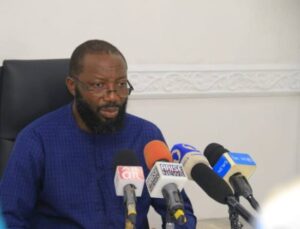
Joyce Veronica Mmereole
In a compelling address at the African Marine Environment Sustainability Initiative (AFMESI) 4th Annual Symposium and Workshop, Capt. Warredi Enisuoh, Executive Director of Operations and Technical Services at Tantita Securities Services Nigeria Limited, highlighted the immense potential of carbon credits for coastal communities, which could generate up to N320 million annually.
Capt. Enisuoh explained that carbon credits—permits allowing the emission of a specified amount of greenhouse gases (GHGs)—offer a viable economic opportunity for communities with forested areas. He pointed out that a single mature tree can absorb up to 80 kilograms of carbon dioxide (CO₂) annually, underscoring the role of natural ecosystems in combating climate change.
Addressing the theme, “Achieving Blue Growth in A Changing Climate – Integrating the Coastal Communities,” Enisuoh expressed concern over Nigeria’s commitment to reducing emissions.
He noted a contradiction in the nation’s approach, highlighting that despite signing the climate change act, investments continue in fossil fuel-dependent infrastructure, such as diesel trains.
“The divide in the fight against emissions is evident. We missed out on the industrial age, but if we embrace carbon credits now, we can turn our forests into a source of wealth,” he said.
Enisuoh emphasized the need for communities to be educated about the value of their forests in the carbon credit market. He suggested that those with carbon credits could collaborate with project developers to fund sustainable initiatives in their areas, such as green infrastructure and conservation projects.
“Those who own carbon credits can exchange them for development,” he explained, advocating for a strategic approach to valuing forest ecosystems.
“To unlock this potential, communities must recognize the specific plants that absorb CO₂ more effectively and the best practices for forest management.”
Also speaking, AFMESI President and Founder, Dr. (Mrs.) Felicia Chinwe Mogo, unveiled the organization’s future targets under a comprehensive Five-Year Strategic Plan. The plan focuses on addressing the challenges posed by climate change and unsustainable marine practices, while unlocking new economic opportunities for Africa’s coastal communities.
In her speech, Dr. Mogo expressed pride and optimism, emphasizing AFMESI’s commitment to ensuring that Africa’s oceans remain a source of life and prosperity for generations to come.
“As we explore the vast opportunities that the blue economy presents, we must reflect on the direction we are taking and the future targets needed to realize our vision for Africa’s oceans and coastal communities,” she stated.
Dr. Mogo emphasized that the future of AFMESI lies in collaboration, adaptation, and innovation.
“Our targets are ambitious, but they are achievable. Together, we can build a blue economy that is sustainable, inclusive, and resilient,” she affirmed, calling on governments, the private sector, academia, civil society, and coastal communities to join in the effort.
The actionable outcomes from the symposium, Dr. Mogo noted, will be consolidated into a communique outlining clear steps for achieving these ambitious targets.

